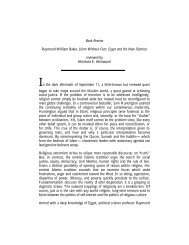Michael J. Thompson Stephen Eric Bronner Wadood Hamad - Logos
Michael J. Thompson Stephen Eric Bronner Wadood Hamad - Logos
Michael J. Thompson Stephen Eric Bronner Wadood Hamad - Logos
You also want an ePaper? Increase the reach of your titles
YUMPU automatically turns print PDFs into web optimized ePapers that Google loves.
Stanley Aronowitz<br />
second half of the 19th century reduced the economic and political influence<br />
of the old middle class to the middle levels of power, mostly in local<br />
communities. The functions of administration, sales and distribution grew<br />
faster than manufacturing, but even in production industries the traditional<br />
blue collar industrial work force expanded more slowly than the bureaucracies<br />
of the various strata of white collar employees.<br />
By World War I, the oligopolistic corporations in basic industries such as steel<br />
and energy, and large light-manufacturing industries such as textiles and<br />
durable consumer goods, banking and insurance, and wholesaling and retail<br />
enterprises, were hiring huge armies of clerical employees and sales personnel,<br />
and smaller but important coteries of engineers, technicians and managers, the<br />
latter growing numerically with the decline of the family owned and operated<br />
firm. To be sure the small firm has survived, according to Mills, but small<br />
business of all types is increasingly unstable:<br />
Nationally, the small businessman is overpowered, politically<br />
and economically, by big business; he therefore tries to ride<br />
with and benefit from the success of big business on the<br />
national political front, even as he fights the economic effects<br />
of big business on the local and state front. (Mills 1951, 51)<br />
Small entrepreneurs go in and out of business, their chance of survival<br />
diminishing with the growth and scope of large scale enterprises: grocery<br />
chains, department stores and large manufacturing corporations all of which<br />
are able to benefit from economies of scale and ample supplies of capital with<br />
which to invest in technological innovation to drive prices down and their<br />
small business competitors out of the marketplace.<br />
Among the diverse strata of the new middle class the managers, according to<br />
Mills, occupy a unique place. The “managerial demiurge” signifies a new form<br />
of power, and not only at the workplace. Their numbers are growing rapidly<br />
and, to the degree they run corporate and government bureaucracies, “the<br />
managerial type of man becomes more important in the total social structure.”<br />
(Mills 1951, 77) While the top managers are given the task of controlling the<br />
underlying population, at every level of economic, political and cultural<br />
activity—middle managers, supervisors and line foreman, as well—the job of<br />
<strong>Logos</strong> 2.3 – Summer 2003




